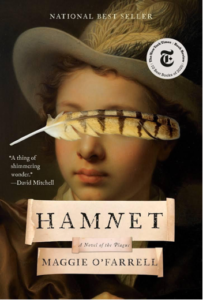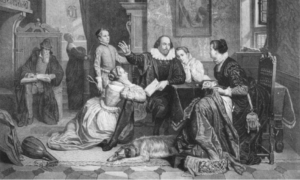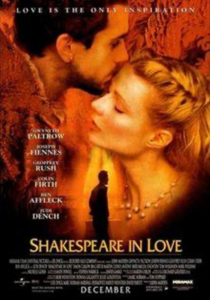Another aspect of the Asian race issue…
The Sunsets!
I came here intending to stay two or three weeks. It looks like I’ll be staying five.
One reason, which I’ve been thinking about, is an effect of the COVID lockdown. I now know, beyond a shadow of a doubt, that I can do my work from anywhere.
Another reason is the sunsets.
In Florida, K and I live across the street from the Atlantic Ocean. And so, we have the privilege of waking up with the sun. Here in Nicaragua, our house overlooks the Pacific Ocean. And so, we get to enjoy the sunsets.
When we get back to the States, I’m going to post a photo-history of our sunsets here. But there is a hint in this photo that shows one thing I prefer about the sunsets.


Hamnet: A Novel of the Plague
By Maggie O’Farrell
384 pages
Published in 2020 by Tinder Press
Hamnet is, as the title suggests, a book about Shakespeare’s son and the plague that killed him. It is also a vivid depiction of England – its culture and its economy – during Elizabeth’s reign. It is, perhaps most of all, a compelling portrait of Agnes, Hamnet’s mother and Shakespeare’s wife.
And finally, it is a brilliantly imagined explanation of how Shakespeare came to write Hamlet, his greatest tragedy (with the possible exception of King Lear).

Shakespeare and family. Hamnet is standing on the left.
What historical fiction like Hamnet does is help fill in the factual blanks with inventive imaginings. And there is so much of that in this book.
If you are a student of Shakespeare, you will love it. If you are not, you may love it too, because of the prose and the storytelling. And if you don’t know anything about Shakespeare’s life, you will enhance your enjoyment of Hamnet by spending a little time reading a summary of it in Wikipedia.
Interesting Facts
* Hamlet and Hamnet were variations of the same name. In the 16th century, English orthography had not yet been formalized. One example: There are something like 6 authenticated signatures by Shakespeare, only 2 of which have the same spelling.
* Maggie O’Farrell won the London Women’s Prize for Fiction (along with £30,000) for Hamnet.
* Hamnet was one of The New York Times’ 10 Best Books of 2020.
Critical Reviews
* “Maggie O’Farrell’s writing is intensely detailed and descriptive, allowing the reader to become encapsulated into the world of Elizabethan England. Her extensive research is evidenced throughout and makes for a really absorbing and enjoyable read.” (Off The Record)
* “Of all the stories that argue and speculate about Shakespeare’s life… here is a novel… so gorgeously written that it transports you.” (Boston Globe)
* “O’Farrell brilliantly turns to historical fiction to confront a parent’s worst nightmare: the death of a child…. Hamnet vividly captures the life-changing intensity of maternity in its myriad stages – from the pain of childbirth to the unassuageable grief of loss.” (NPR)

Shakespeare in Love (1998)
Directed by John Madden
Starring Gwyneth Paltrow, Joseph Fiennes, Judi Dench, and Geoffrey Rush
As I said above, Hamnet is, a part, an imaginary account of how Shakespeare came to write Hamlet. The Book was very good. And so, after finishing it, I felt I needed more. And I knew just the thing. A movie that I’d be watching for the second time.
Shakespeare in Love is an imaginary account of how the bard dreamed up the plot of Romeo and Juliet, his best-loved play.
I don’t know if I’d call it a historical romance or a comedic period piece. It has all of those elements and a bit of action, too.
Something I most liked about it when I first saw Shakespeare in Love was the trope of including historical people in the movie that weren’t a necessary part of the plot, but added some fun for anyone that had a passing knowledge of the theater scene in Elizabethan England.
For example, without comment, the movie demonstrated the political and commercial challenges of running a theater in England at that time, the custom of using an all-male cast and pre-pubescent boys to play female parts, the fact that Shakespeare and the other great playwrights of his time routinely acted in one another’s plays to make ends meet – not to mention the above-referenced theory that Shakespeare didn’t write his own stuff. This is brilliantly depicted by having his friend, Christopher Marlowe, frequently give Shakespeare tips on plot twists and even the naming of Romeo and Juliet.
There is also a wonderful character – a young boy that hangs around the theater catching rats – who, though never named, seemed to be the childhood version of Thomas Kyd, a playwright that was active a generation after Shakespeare and whose plays were known for being dark and even macabre.
I remembered, too, how much I liked the script when I first saw the movie. The wit and beauty of the language, and the ingenious way Marc Norman and Tom Stoppard wove into the dialog so many phrases that we know from Shakespeare’s plays.
I’m happy to report that these rewards were still available to me in this second watching. In some ways, I enjoyed them even more.
One problem: I couldn’t so much enjoy the plot as I had the first time.
This second time around, I couldn’t sympathize as much with the character of Shakespeare and enjoy as much the relationship he had with the Gwyneth Paltrow character.
And that was because, having just read Hamnet, I had become a big fan of Agnes, Shakespeare’s amazing wife, who was back in Stratford, taking care of the kids, as well as making extra money on the side, while her husband, the great bard, was philandering in London!
What You Will Like About Shakespeare in Love – Even the Second Time Around
The script, as I said, is wonderful.
The acting is good, but understandably theatrical.
The scenes, cinematography, and direction are all very good.
The plot is smart and the action is compelling.
And Gwyneth Paltrow is amazing – her stage presence, her acting, and her beauty.
I’ve sometimes wondered if every beautiful actress hasn’t had a film in which, as a young woman, she was at her most stunning. Like Cybill Shepherd in The Last Picture Show. Like Elizabeth Taylor in Cleopatra. Like Marilyn Monroe in The Seven Year Itch. For Gwyneth Paltrow, it could be Shakespeare in Love.
Interesting Facts
* Shakespeare in Love won the Academy Award for Best Picture. And despite being on screen for only about 8 minutes, Dame Judi Dench’s portrayal of Queen Elizabeth won her the Oscar for Best Supporting Actress – her only win in seven nominations.
* In the movie, Will writes Sonnet 18 (“Shall I compare thee to a summer’s day”) for Viola. In reality, Shakespeare addressed it (and all of the first 126 sonnets) not to a woman but to a “Fair Youth.”
Critical Reviews
* “You can’t miss with a movie that speaks the language of love with such hotblooded delight. And in iambic pentameter, too.” (Rolling Stone)
* “Gwyneth Paltrow, in her first great, fully realized starring performance, makes a heroine so breathtaking that she seems utterly plausible as the playwright’s guiding light.” (New York Times)
* “Scene after scene engages us as cheerful groundlings, tosses us jokes, toys with our expectations, then sweeps away the boundaries between film and stage, comedy and tragedy so we’re open to the power of language and the feelings behind it.” (Wall Street Journal)
You’re not interested in breakdancing. Fine. But tell me you’re not amazed by the performance of this six-year-old girl.

Kevin K, with whom I climbed Mt. Kilimanjaro in February 2010, sent me an obit from the NYT for Aleksander Doba, a man who kayaked across the Atlantic three times – twice in his 60s and then again when he was 70. According to the obit, he sustained himself on his third trip by eating his wife’s “fortifying” plum jam. This year, he challenged himself to climb Mt. Kilimanjaro. He arrived in Tanzania last month. On the morning of February 22, he reached the summit, with two guides. After taking in the view, he sat on a rock to rest. And then he died. “He said he didn’t want to die in his bed,” his son said. “From what we gather, he was euphoric to reach the summit. Then he sat down and fell asleep.”
“Own only what you can always carry with you: Know languages, know countries, know people. Let your memory be your travel bag.” – Aleksandr Solzhenitsyn
How to Learn Multiple Languages in 15 Minutes a Day
If you want to learn a new language or brush up on one you know, forget about the Berlitz or Rosetta Stone courses. Start reading Quora in the language(s) of your choice.
Quora publishes questions and answers (submitted by users) on its website daily. The most popular questions, which are usually the stupidest, rise to the top.
Because the questions are stupid, you won’t run into any answers that you can’t practically figure out yourself without looking. Plus, since they are universally dumb, you’ve may have heard them (or, Lord forbid) asked them before.
Check it out at Quora.com.
“Microaggressions” and Other Dangerous Words
According to an article in Business Insider, there are 14 things you should never say at work (or anywhere else) because they are “indirect expressions of racism, sexism, ageism, or ableism.”
Here are some examples of these “microaggressions”:
* “You’re transgender? Wow, You don’t look like it at all.”
* “Oh, you’re gay? You should meet my friend Ann. She’s gay, too!”
* “My [female] boss is crazy.”
* “Where are you actually from?”
* “The way you’ve overcome your disability is so inspiring.”
* “Your name is so hard to pronounce.”
* “Are you an intern? You look so young!”
* “Is that your real hair?”
To read the article – which includes much-too-long explanations of why these words are offensive, along with suggestions of what to do instead – click here. (Spoiler alert: Most of the time, the suggestion is “Say nothing.”)
Meanwhile…
An Episcopal church in Manhattan is going the extra mile to insure its children feel protected from such dangerous words as “mom” and “dad.” Read the story here.
Trying to be reasonable in an unreasonable world…
“We’re all the heroes of our own stories.” – George R.R. Martin
I’ve mentioned before (January 25) that I’m doing this StoryWorth thing – writing anecdotes about my life to include in a family-tree book I’ve been working on for years.
I like the service, because you get a prompt once a week on a different topic. If the prompt doesn’t inspire you, you can write something else.
Here’s a recent piece I sent in. (It has a moral. I’m sure you can figure it out for yourself.)
A Lesson I Learned in High School
One of the most important lessons I learned in high school was taught to me by Mr. Ringwald, my Spanish 101 teacher.
The first day of class, calling the roll, he came to my name and asked me to stand up.
“I’ve heard about you,” he said.
I made some wiseass crack. The class laughed. (My reward.)
“I guess what I heard was true.”
I shrugged. He went on with the roll call. I sat down.
He stopped speaking and scowled at me.
“Did I ask you to sit down?”
“Duh. No.”
“Well then stand up, please.”
I did. The class laughed. I smirked, pretending I was still in charge.
He noticed the smirk.
“And while you are at it, put your hands on your head. I want to be sure that I know where they are at all times.”
The class laughed. I reluctantly complied.
He finished the roll call. Then he asked the class to open their textbooks.
I sat down and opened my book.
“Did I ask you to sit down, Mr. Ford?”
“Duh. No.”
“Well then, resume your position.”
More laughter. Reluctant compliance.
I stood there like that, feeling like an idiot with my hands on my head, until the end of the class.
At the bell, as I was leaving, Mr. Ringwald stopped me to say, “By the way, Mr. Ford… you can rest assured that I will let you know, sometime in the future, when you can sit down again like a civilized young student.”
He meant it.
For the next three or four weeks, I spent every class standing in that humiliating position.
And then one day, sensing my breaking was completed, he allowed me to sit. I never made another crack in his class. And I even learned a little Spanish.
